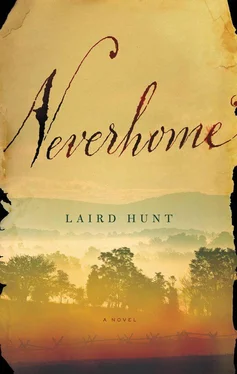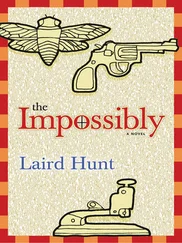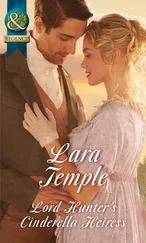She showed me the letter and I looked a little at it. There was a brown thumbprint on the left side of the page where someone with dirty fingers had held it. The bottom half of the page had been torn off. The General had a long, tall hand looked something like he did. He had written in a kind of purple ink that bled here and there around the letters, making some of the curlicues look like chrysanthemums.
“He knew it about me long before anyone else,” I said.
“I can well imagine that he did,” she said.
“But he said nothing.”
“No, he wouldn’t have.”
“Why wouldn’t he have?”
“I don’t know.”
“What was he a professor of?”
“Greek and Latin.”
“I am very tired.”
“Then you must come in the house, Private Thompson, and lie down.”

I stayed at the house of the General still away at war and of his wife, who was good to me, for longer than I would have thought, for the crops were up and it was deep on into summer when I started to think about setting back out on my road. I had stayed all that time in the big room that had been the General’s brother’s and as I began at least in my mind to step away from the house and make north and west for home, I thought considerably about his soft eiderdown and good feather bed. It had been the kind of bed you could bury yourself down into and let the warmth and softness smother your dreams. There was something about that bed had to do in my mind with the Indian mound and the chair in the madhouse and the General’s brother’s grave and my mother’s grave and the one I had waiting for me soon or late whether I did or I didn’t keep on. It was that trick of did or didn’t got me slowed and looking slow one way and then the other and then no way at all. In the middle of that no way I found a bucket. Filled up with tears. The bucket was leaking. I wiped my cheeks with the pillowcase. There was some more leak came out. I had never cried beyond getting my eyes damp before. Or any good crying I had done was past my remembering of it: scrawny child in her mother’s arms. I did not like that I was doing it now but couldn’t see any way to stop it. My bucket was still leaking when the General’s wife knocked on my door one warm late morning and told me to come down, someone needed my help.
“I fear I am indisposed, ma’am,” I told her.
“Well, dispose of your upset and come on down,” she said back.
It was a wagon with an old man looked an awful lot at first glance like my beau from the road. This man didn’t have any chaw dribble in his beard, though, and when I walked up with the General’s wife, he took off his hat and gave a nice nod. He was soft and green of eye to the point that they watered what looked like tiny green leaves and after I had made my own head nod back at him I could see he was missing an arm.
“I can do it all but I can’t shift boxes,” he said.
“Glad to help you,” I said.
The General’s wife gave us each a good smile and we left, or that’s how it seemed as I thought about it later as the old man’s mare went trotting along. There had been the General’s wife’s smile and then there was us, me and the old man, his watery eyes and my leaky bucket, and the open road leading us out of town.
“You take snuff?” the old man said, reaching into his waist pocket, pulling out a turquoise bag, and fetching out a pinch.
“No,” I said, then I said, “Yes,” thinking it might help wake me up away from my reveries.
“Those are strong-looking hands you’re wearing there,” the old man said after I had stopped my sneezing.
“My name is Constance,” I said.
“I know it,” he said. “We got introduced back there in town.”
I didn’t say anything to this and we rolled on a ways in silence, up a flower-topped hill and down its other side. The old man had been casting me quick glances with those watery green eyes and after another minute of rolling he said, “Weatherby. Weatherby is my name.”
“Nice to meet you,” I said.
“Meet you again, is what you mean.”
We rolled some more and hit a patch of crows working a deer carcass, and Weatherby said it looked like they were having a grand time. That there was few things happier than an animal had found its midday meal. He said the General’s wife had packed us sandwiches and after we had picked up our load we could have a picnic under a shade tree. There was nothing, he said, like a picnic under a shade tree, a picnic under a shade tree in the summertime couldn’t be beat if you worked at it a year. Then he said if he had a handkerchief he would offer it to me. I hadn’t realized it but my bucket was back at it, leaking tears out of my eyes, brown ones. Dead leaves. Creek mud. Falling down my face and off my jaw.
“I understand you’ve had some scare out along the road and seen some things of the war,” Weatherby said.
“I am sorry,” I said. “I do not know myself, I do not know myself at all.”
“I lost this arm in a fight fifty years ago,” he said. “My son is gone and my grandson is still down there in the Shenandoah.”
“Then I pity you,” I said.
“Pity the whole wide world while you’re at it,” he said. “But what I meant by that remark was that I’ve done my share of letting it leak out too.”
I wiped my face on my shirtsleeve. It did not strike me until later that he had used the word leak in referring to his tears. I did not cry ever again after those days of care and comfort in Ohio, but forever after when I saw someone at it, large or small, I thought of buckets dripping their contents.
“I thought I was turning into a crybaby,” I said when we had got a little farther and I realized my face had stayed dry.
“You don’t look like any crybaby to me,” he said.
He had let the mare slow to a dull step but now he flicked the reins and we jollied on.
There were fifteen crates to be carried and we found them stacked neat in the front of a shop had been owned by a man had earned some of his living making likenesses up into the war. The machine stood with its black shawl in the center of the shop opposite a red velvet curtain hung over a vanity screen. The likeness-maker’s sister, who was overseeing the affair, said we could take the machine in the bargain if we wanted it but I didn’t say a word and Weatherby shook his head. There was a coal-black chicken in the shop with us while we worked. It was pecking at the cork on a jug under one of the benches and didn’t let anything disturb it. It wasn’t any work at all to shift the crates to the wagon but Weatherby fretted some over how I stacked them in.
There were shade trees aplenty on the dead likeness-maker’s property but Weatherby said that if I could wait, there was a spot he liked back down the road. We pulled up some water was warmer than it ought to have been from a well with a mossy rope and slaked off our thirst. As I held the wet well bucket in my hands, I waited a minute to see if I would start back at it but I didn’t. When we were set to go, the sister came out, took Weatherby’s money without a word or sign, then disappeared into the dead likeness-maker’s house again.
We had our picnic under a giant crab apple had once, said Weatherby, stood beside a house that had vanished along with all of its traces from the earth. He knew of this house because he had once worked its fields, or something to that effect. Some in the neighborhood believed a tornado had picked the house up and flung it, along with a family full of children, down into Kentucky or up over the Great Lakes.
“You ever see a tornado, Constance?” he asked me.
“I saw the war is all.”
Читать дальше













